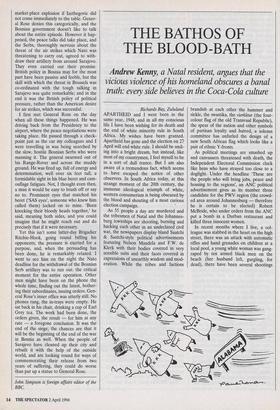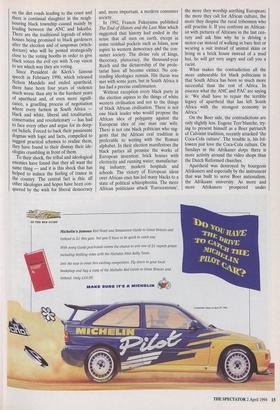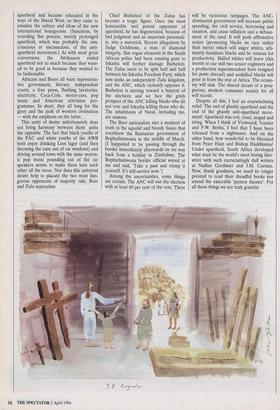THE BATHOS OF THE BLOOD-BATH
Andrew Kenny, a Natal resident, argues that the vicious violence of his homeland obscures a banal truth: every side believes in the Coca-Cola culture Richards Bay, Zululand APARTHEID and I were born in the same year, 1948, and in all, my conscious life I have been wishing for its death and the end of white minority rule in South Africa. My wishes have been granted. Apartheid has gone and the election on 27 April will end white rule. I should be smil- ing into a bright dream, but instead, like most of my countrymen, I feel myself to be in a sort of dull trance. But I am also aware of a tremendous fact, which seems to have escaped the notice of other observers. In South Africa today, at this strange moment of the 20th century, the immense ideological triumph of white, western consumerism is being obscured by the blood and shouting of a most curious election campaign.
As 55 people a day are murdered and the tribesmen of Natal and the Johannes- burg townships are shooting, burning and hacking each other in an undeclared civil war, the newspapers display bland Saatchi & Saatchi-style political advertisements featuring Nelson Mandela and F.W. de Klerk with their bodies covered in very sensible suits and their faces covered in expressions of unearthly wisdom and mod- eration. While the tribes and factions brandish at each other the hammer and sickle, the swastika, the vierkleur (the four- colour flag of the old Transvaal Republic), the spear of the nation and other symbols of partisan loyalty and hatred, a solemn committee has unfurled the design of a new South African flag which looks like a pair of ethnic Y-fronts.
As political meetings are smashed up and canvassers threatened with death, the Independent Electoral Commission cluck like hens who have strayed too close to a dogfight. Under the headline 'These are the people who will bring jobs, peace and housing to the regions', an ANC political advertisement gives as its number three candidate for the PWV region (the crowd- ed area around Johannesburg — therefore he is certain to be elected) Robert McBride, who under orders from the ANC put a bomb in a Durban restaurant and killed three innocent women.
In recent months where I live, a col- league was stabbed in the heart on the high street, there was an attack with automatic rifles and hand grenades on children at a local pool, a young white woman was gang- raped by ten armed black men on the beach (her husband left, gurgling, for dead), there have been several shootings
on the dirt roads leading to the coast and there is continual slaughter in the neigh- bouring black township caused mainly by feuding between the ANC and Inkatha. There are the traditional legends of white houses being promised to black gardeners after the election and of sangomas (witch- doctors) who will be posted strategically close to the voting booths in order to give black voters the evil eye with X-ray vision to see which way they are voting. Since President de Klerk's famous Speech in February 1990, which released Nelson Mandela and ended apartheid, there have been four years of violence much worse than any in the harshest years of apartheid and, of even more signifi- cance, a gruelling process of negotiation where every faction in South Africa — black and white, liberal and totalitarian, conservative and revolutionary — has had to face every other and argue for its deep- est beliefs. Forced to back their passionate dogmas with logic and facts, compelled to suggest practical schemes to realise them, they have found to their dismay their ide- ologies crumbling in front of them. To their shock, the tribal and ideological enemies have found that they all want the same thing — and it is this shock that has helped to induce the feeling of trance in the country. The central fact is this: all other ideologies and hopes have been con- quered by the wish for liberal democracy and, more important, a modern consumer society.
In 1992, Francis Fukuyama published The End of History and the Last Man which suggested that history had ended in the sense that all men on earth, except in some residual pockets such as Islam, now aspire to western democracy and the con- sumer society. The divine rule of kings, theocracy, plutocracy, the thousand-year Reich and the dictatorship of the prole- tariat have all become extinct. No con- tending ideologies remain. His thesis was met with some jeers, but in South Africa it has had a precise confirmation.
Without exception every black party in the election aspires to the things of white western civilisation and not to the things of black African civilisation. There is not one black leader who would propose the African idea of polygamy against the European idea of one man one wife. There is not one black politician who sug- gests that the African oral tradition is preferable to writing with the Roman alphabet. In their election manifestoes the black parties all promise the works of European invention: brick houses with electricity and running water; manufactur- ing industry; modern hospitals and schools. The victory of European ideas over African ones has led many blacks to a state of political schizophrenia. The more African politicians attack 'Eurocentrism', the more they worship anything European; the more they call for African culture, the more they despise the rural tribesmen who still practise it. If you confront an African- ist with pictures of Africans in the last cen- tury and ask him why he is driving a motor-car instead of walking in bare feet or wearing a suit instead of animal skins or living in a brick house instead of a mud hut, he will get very angry and call you a racist.
What makes the contradiction all the more unbearable for black politicians is that South Africa has been so much more successful than the rest of Africa. In essence what the ANC and PAC are saying is: 'We shall have to repair the terrible legacy of apartheid that has left South Africa with the strongest economy in Africa.'
On the Boer side, the contradictions are only slightly less. Eugene Terr'blanche, try- ing to present himself as a Boer patriarch of Calvinist tradition, recently attacked 'the Coca-Cola culture'. The trouble is, his fol- lowers just love the Coca-Cola culture. On Sundays in the Afrikaner dotps there is more activity around the video shops than the Dutch Reformed churches.
Apartheid was destroyed by bourgeois Afrikaners and especially by the instrument that was built to serve Boer nationalism, the Afrikaans university. As more and more Afrikaners prospered under apartheid and became educated in the ways of the liberal West, so they came to emulate the culture and ideas of the new international bourgeoisie. (Sanctions, by retarding this process, merely prolonged apartheid, which was probably the aim, conscious or unconscious, of the anti- apartheid movement.) As with most great conversions, the Afrikaners ended apartheid not so much because they want- ed to be good as because they wanted to be fashionable.
Africans and Boers all want representa- tive government, literacy, independent courts, a free press, flushing lavatories, electricity, Coca-Cola, motor-cars, pop music and American television pro- grammes. In short, they all long for the glory and the junk of western civilisation — with the emphasis on the latter.
This unity of desire unfortunately does not bring harmony between them: quite the opposite. The fact that black youths of the PAC and white youths of the AWB both enjoy drinking Lion lager (and then throwing the cans out of car windows) and driving around town with the same moron- ic pop music pounding out of the car speakers seems to make them hate each other all the more. Nor does this universal desire help to placate the two most dan- gerous opponents of majority rule, Boer and Zulu separatists. Chief Buthelezi of the Zulus has become a tragic figure. Once the most honourable and potent opponent of apartheid, he has degenerated, because of bad judgment and an uncertain personali- ty, into a maverick. Recent allegations by Judge Goldstone, a man of diamond integrity, that rogue elements in the South African police had been running guns to Inkatha will further damage Buthelezi. The Zulus seem to be split half and half between his Inkatha Freedom Party, which now seeks an independent Zulu kingdom, and the ANC, which violently opposes it. Buthelezi is moving toward a boycott of the elections and we face the grisly prospect of the ANC killing blacks who do not vote and Inkatha killing those who do. The inhabitants of Natal, including me, are anxious.
The Boer nationalists met a moment of truth in the squalid and bloody fiasco that overthrew the Bantustan government of Bophuthatswana in the middle of March. (I happened to be passing through the border immediately afterwards on my way back from a holiday in Zimbabwe. The Bophuthatswana border official waved at me and said, 'Take a pass and stamp it yourself. It's self-service now.') Among the uncertainties, some things are certain. The ANC will win the election with at least 60 per cent of the vote. There will be victorious rampages. The ANC- dominated government will increase public spending, the civil service, borrowing and taxation, and cause inflation and a debase- ment of the rand. It will push affirmative action (promoting blacks on race rather than merit) which will anger whites, ulti- mately humiliate blacks and be ruinous for productivity. Skilled whites will leave (this month at our mill two senior engineers and a production superintendent have resigned for posts abroad) and unskilled blacks will pour in from the rest of Africa. The econo- my will sink. The shared dream of a pros- perous, modern consumer society for all will recede.
Despite all this, I feel an overwhelming relief. The end of ghastly apartheid and the end of the ghastly anti-apartheid move- ment! Apartheid was evil, cruel, stupid and tiring. When I think of Verwoerd, Vorster and P.W. Botha, I feel that I have been released from a nightmare. And on the other hand, how wonderful to be liberated from Peter Hain and Bishop Huddleston! Under apartheid, South Africa developed what must be the world's most boring liter- ature with such excruciatingly dull writers as Nadine Gordimer and J.M. Coetzee. Now, thank goodness, we need no longer pretend to read their dreadful books nor attend the execrable 'protest theatre'. For all these things we are truly grateful.




























































 Previous page
Previous page